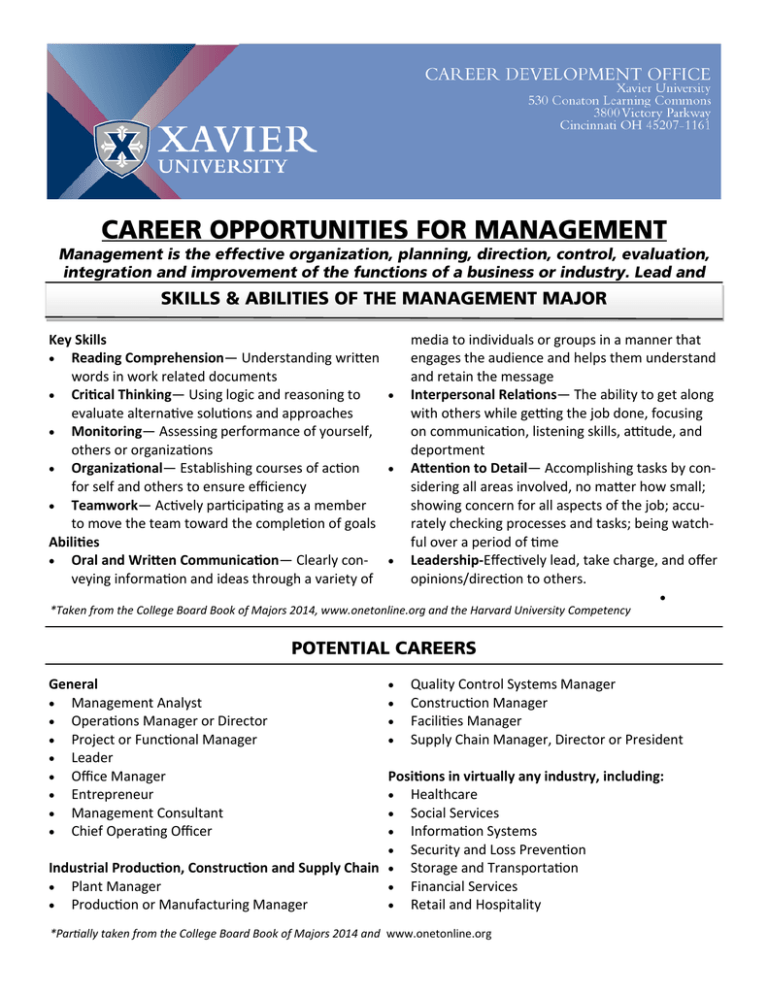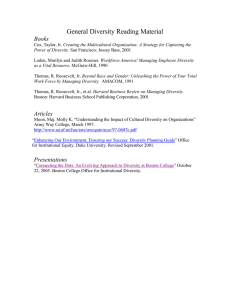Key Skills Reading Comprehension engages the audience and helps them understand
advertisement

Key Skills Reading Comprehension— Understanding written words in work related documents Critical Thinking— Using logic and reasoning to evaluate alternative solutions and approaches Monitoring— Assessing performance of yourself, others or organizations Organizational— Establishing courses of action for self and others to ensure efficiency Teamwork— Actively participating as a member to move the team toward the completion of goals Abilities Oral and Written Communication— Clearly con veying information and ideas through a variety of media to individuals or groups in a manner that engages the audience and helps them understand and retain the message Interpersonal Relations— The ability to get along with others while getting the job done, focusing on communication, listening skills, attitude, and deportment Attention to Detail— Accomplishing tasks by considering all areas involved, no matter how small; showing concern for all aspects of the job; accurately checking processes and tasks; being watchful over a period of time Leadership-Effectively lead, take charge, and offer opinions/direction to others. *Taken from the College Board Book of Majors 2014, www.onetonline.org and the Harvard University Competency General Management Analyst Operations Manager or Director Project or Functional Manager Leader Office Manager Entrepreneur Management Consultant Chief Operating Officer Quality Control Systems Manager Construction Manager Facilities Manager Supply Chain Manager, Director or President Positions in virtually any industry, including: Healthcare Social Services Information Systems Security and Loss Prevention Industrial Production, Construction and Supply Chain Storage and Transportation Plant Manager Financial Services Production or Manufacturing Manager Retail and Hospitality *Partially taken from the College Board Book of Majors 2014 and www.onetonline.org Relationship Building– These types of positions require the need to effectively build relationships with staff, partners, stakeholders and community members. Independence-Allows one to work on their own and make independently decisions. Self-Control– Requires maintaining composure, controlling anger and avoiding emotional responses, even in adverse situations. General Oversee activities concerned with product production, pricing, sales, distribution or services Review financial statements, activity reports, and other performance data to analyze productivity Identify business areas for cost reduction and program improvement opportunities Manage staff, prepare work schedules and assign duties Manage finances and budgets Maximize investments and improve efficiency Hospitality and Retail Resolve customer complaints Manage staffing and performance evaluations Determine prices and discounts Analyze reports to project sales and goals Industrial Production Attention to Detail-Requires careful review of detail when reviewing work. Initiative-Requires the willingness to take on additional roles and responsibilities. Review processing schedules or production orders to make decisions concerning inventory, staffing, procedures, and duties Analyze budget limitations and time constraints Manage production, processing, distribution, or marketing activities Develop or implement production tracking or quality control systems to detect production problems Supply Chain Forecast demand and create supply plans Monitor forecasts and quotas to identify potential impact on supply chain Define and measure performance metrics Analyze inventories to increase efficiency *Taken from www.onetonline.org Management Club (Xavier University) American Management Association (AMA): www.amanet.org American Production & Inventory Control Society (APICS): www.apics.org Entrepreneurs’ Organization (EO): www.eonetwork.org DECA: www.deca.org/college-programs Cameron, B (2005). Careers for Born Leaders & Other Decisive Types. Second Edition. Harvard Business School, (2006). Leading Teams: expert Solutions to Everyday Challenges. Pocket Mentor Series. Boston. Massachusetts: Harvard Business School. Harvard Business School, (2006). Managing Stress. Pocket Mentor Series. Boston. Massachusetts: Harvard Business School. Harvard Business School, (2006). Managing Projects. Pocket Mentor Series. Boston. Massachusetts: Harvard Business School. Harvard Business School, (2006). Managing Projects. Pocket Mentor Series. Boston. Massachusetts: Harvard Business School.


